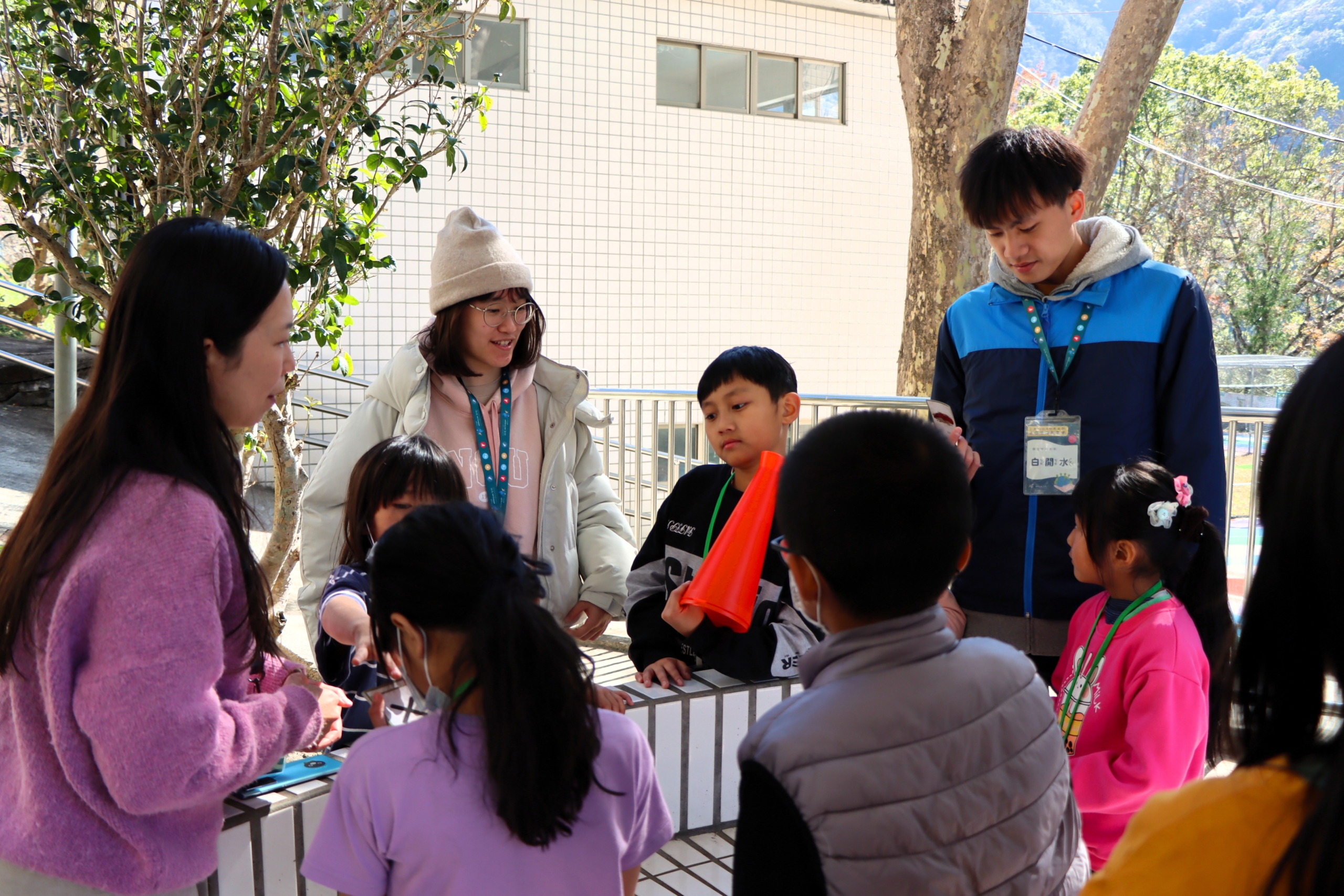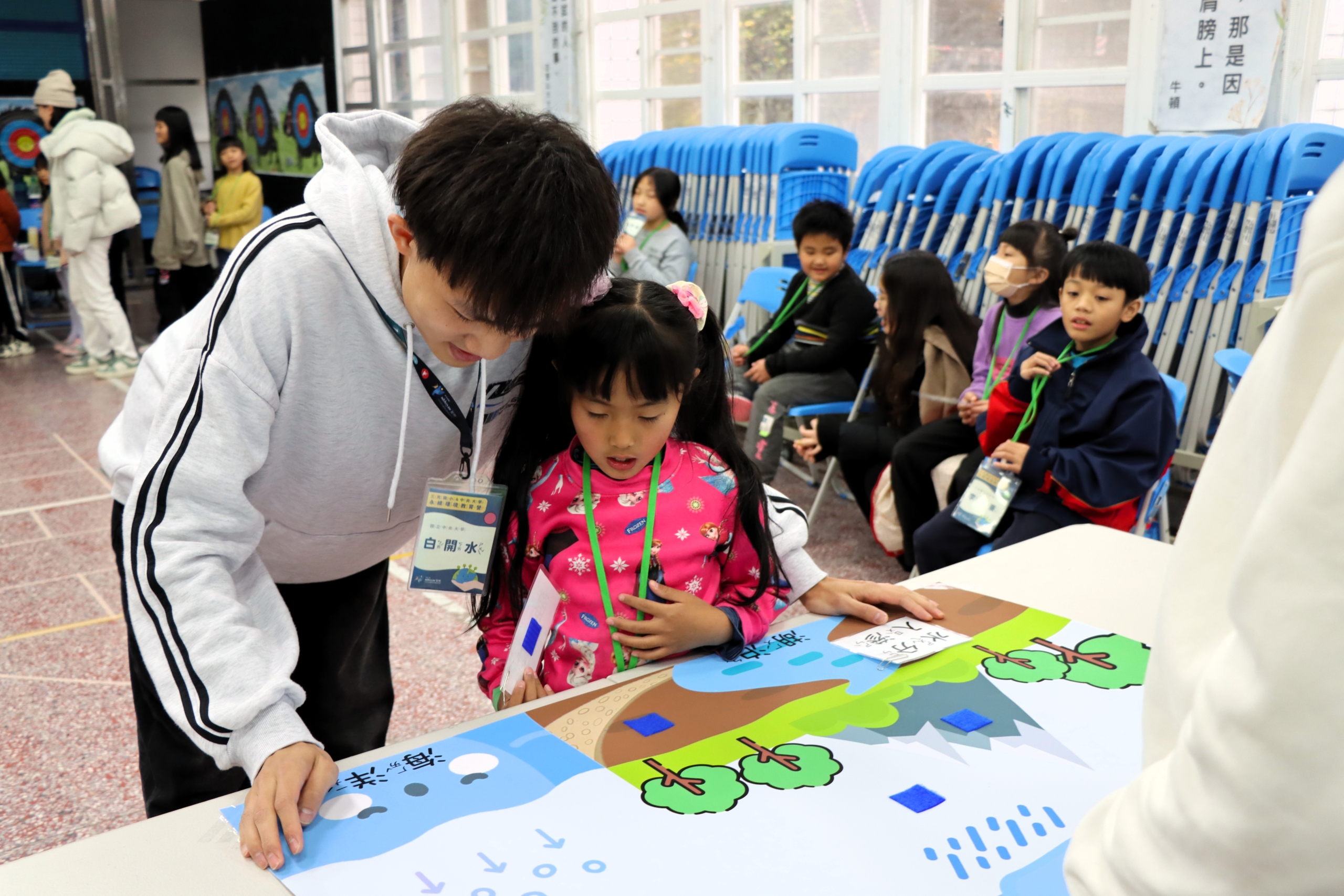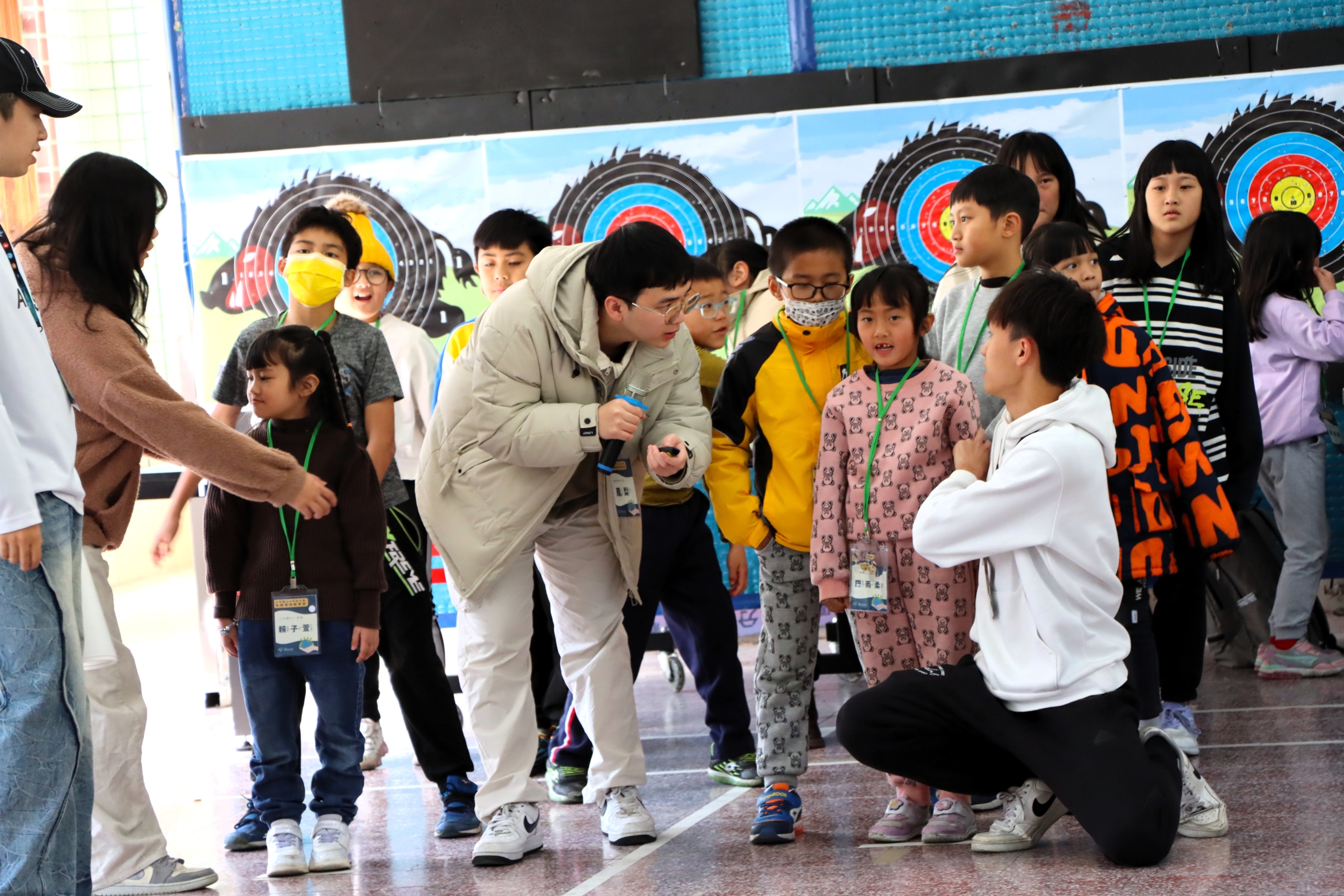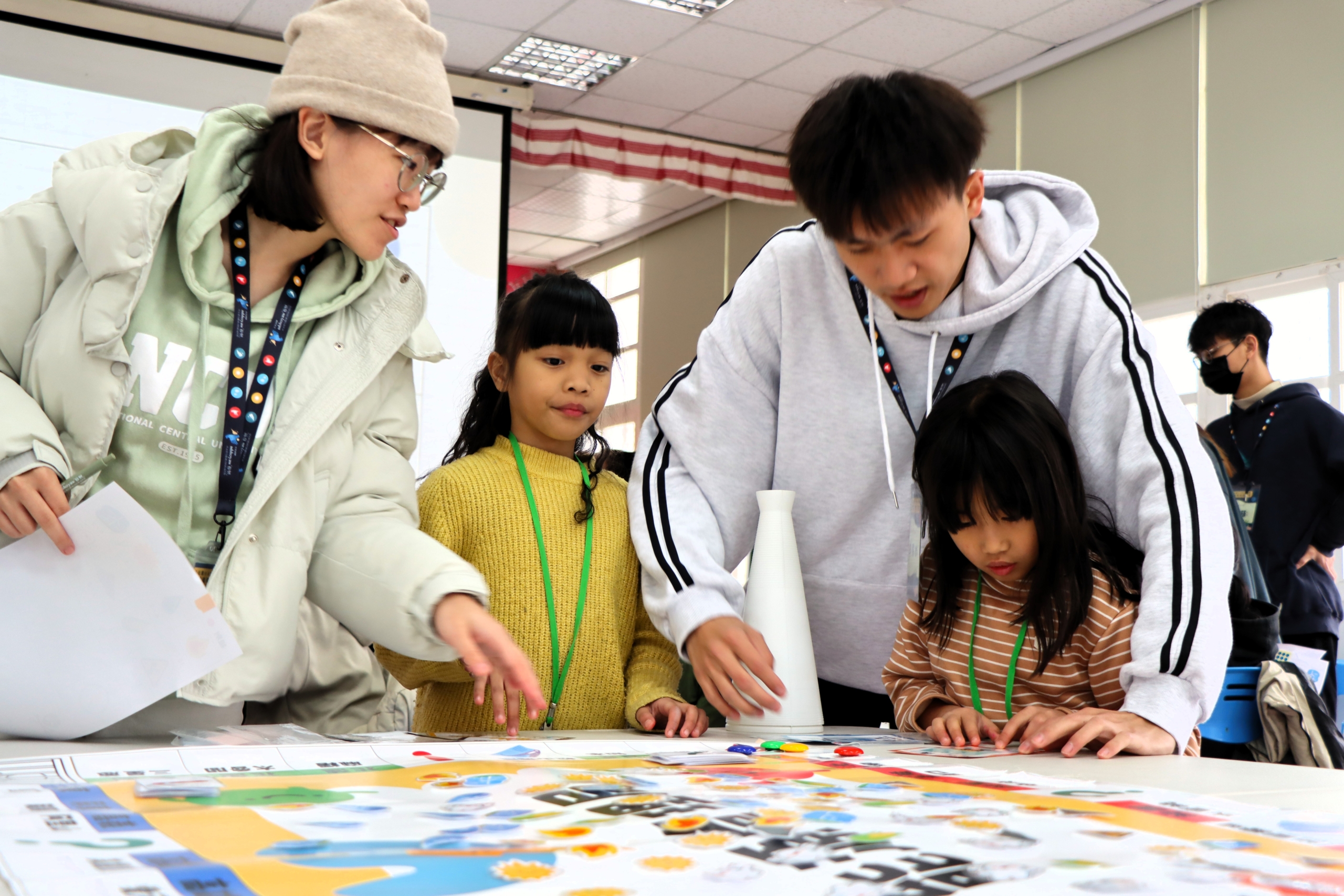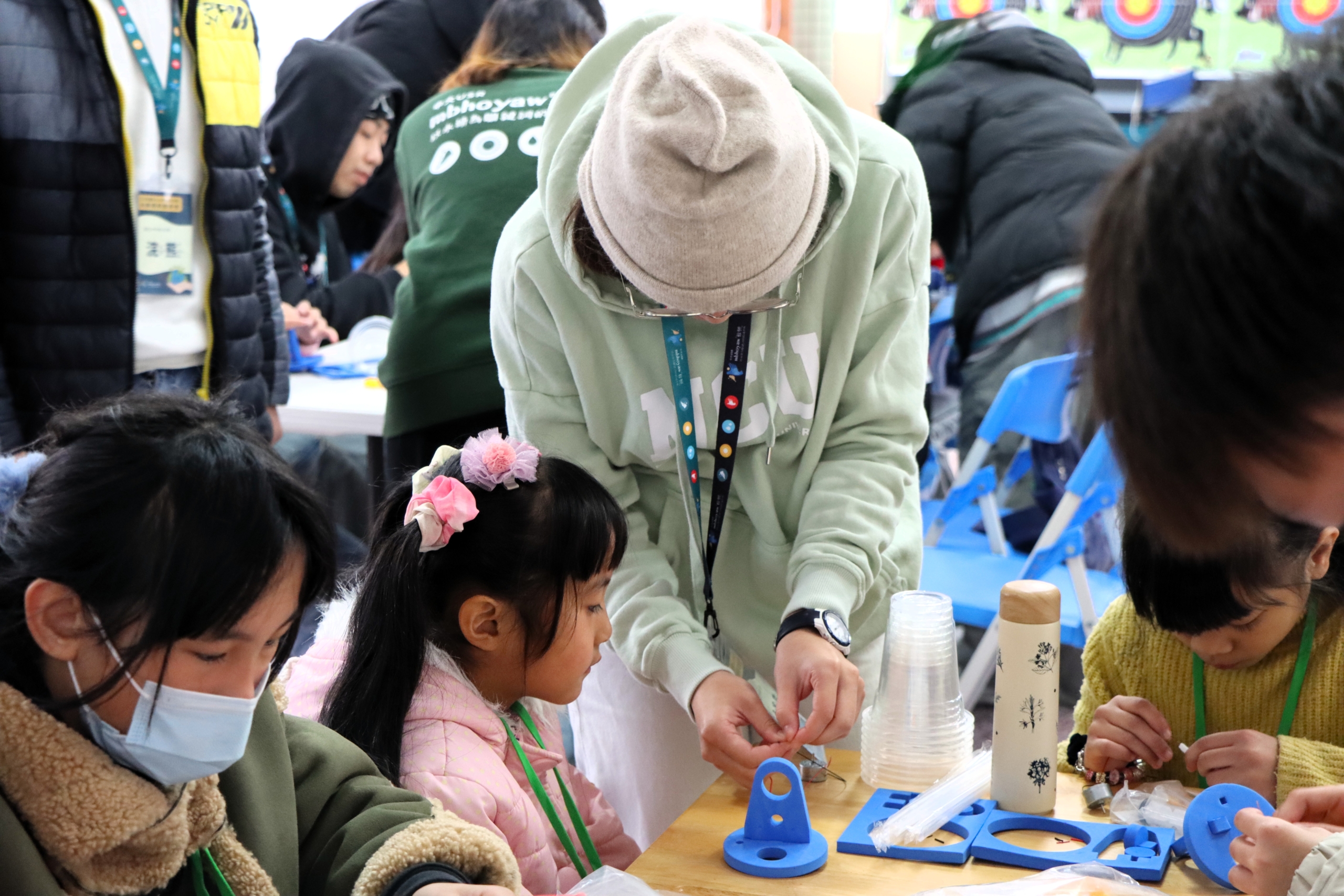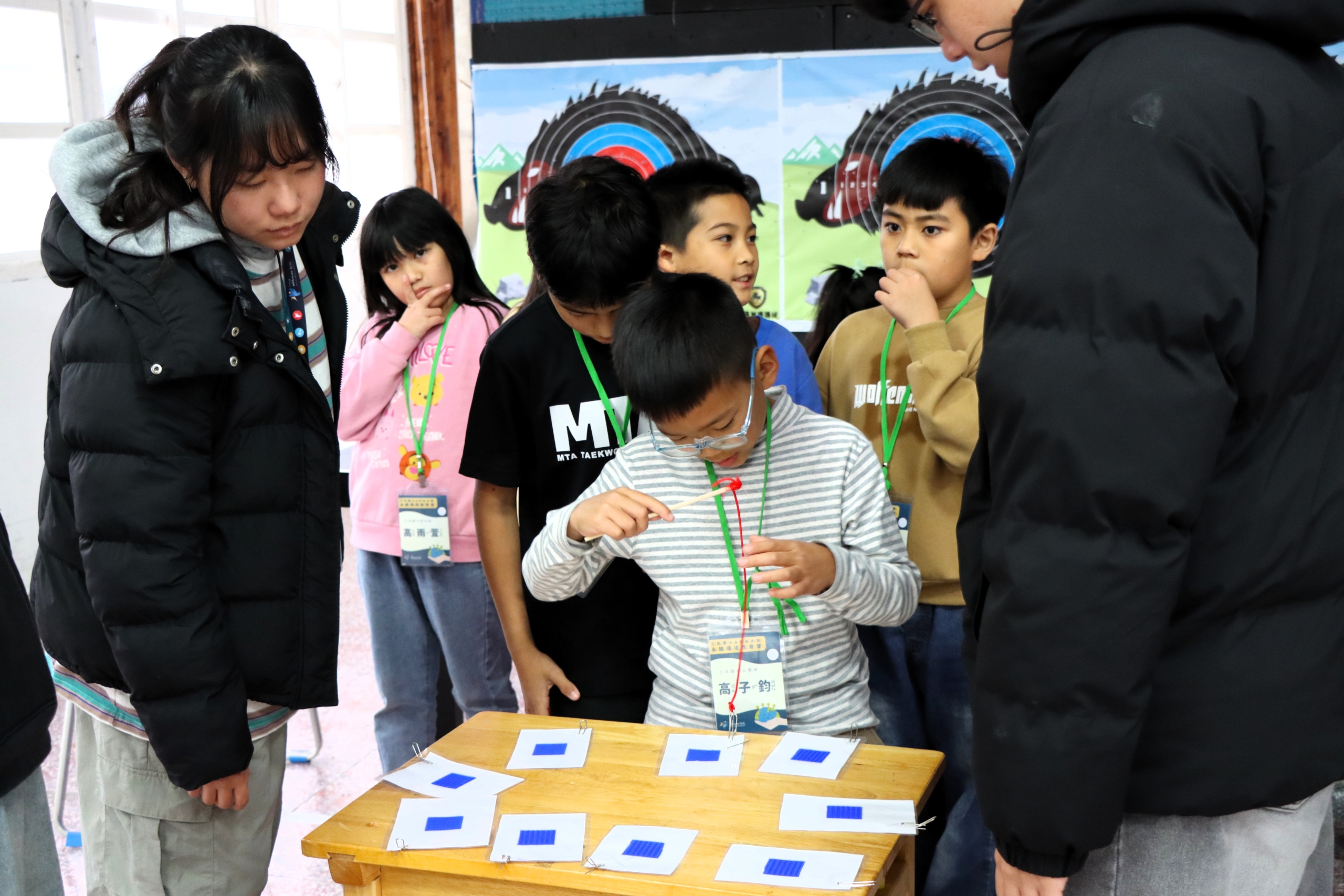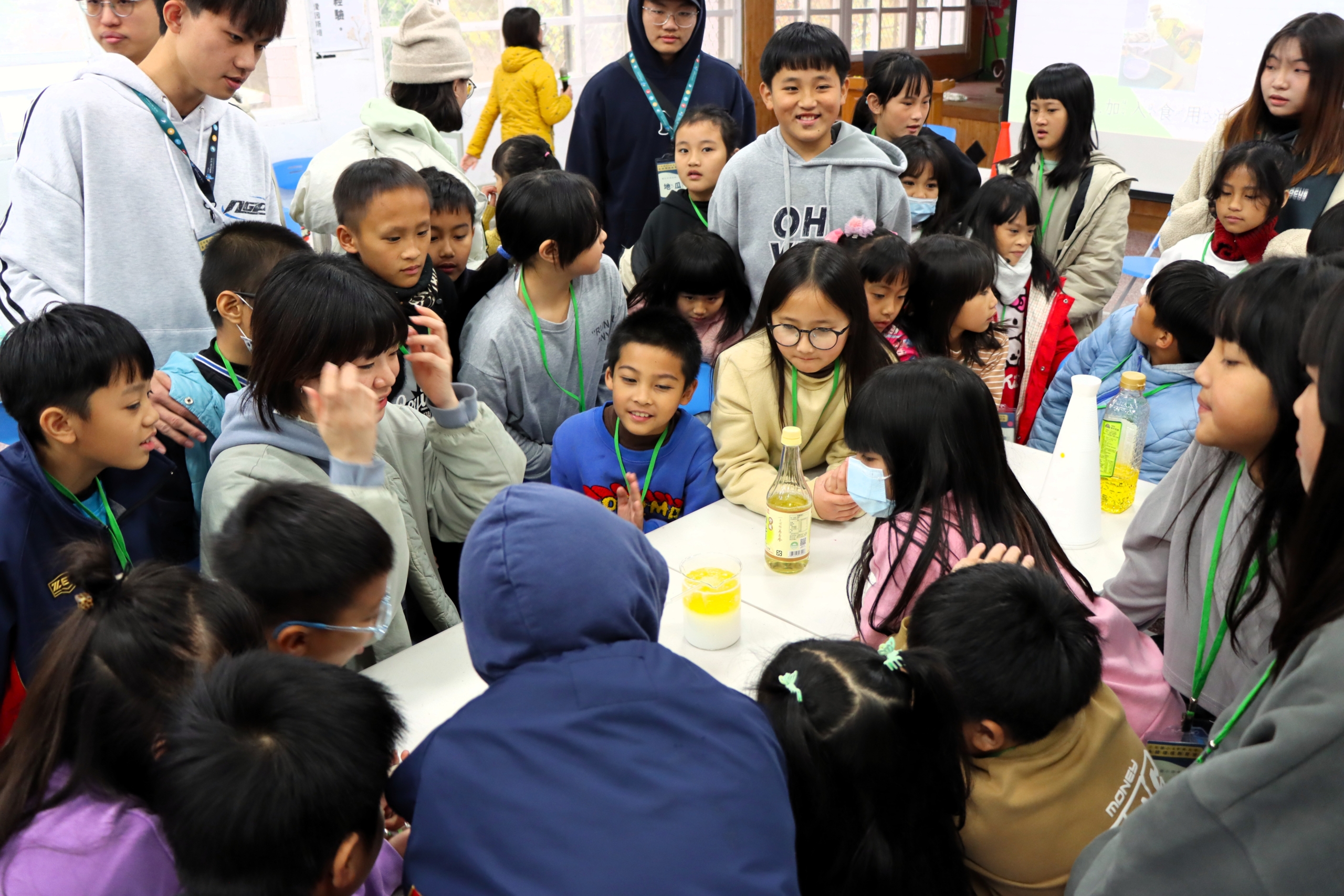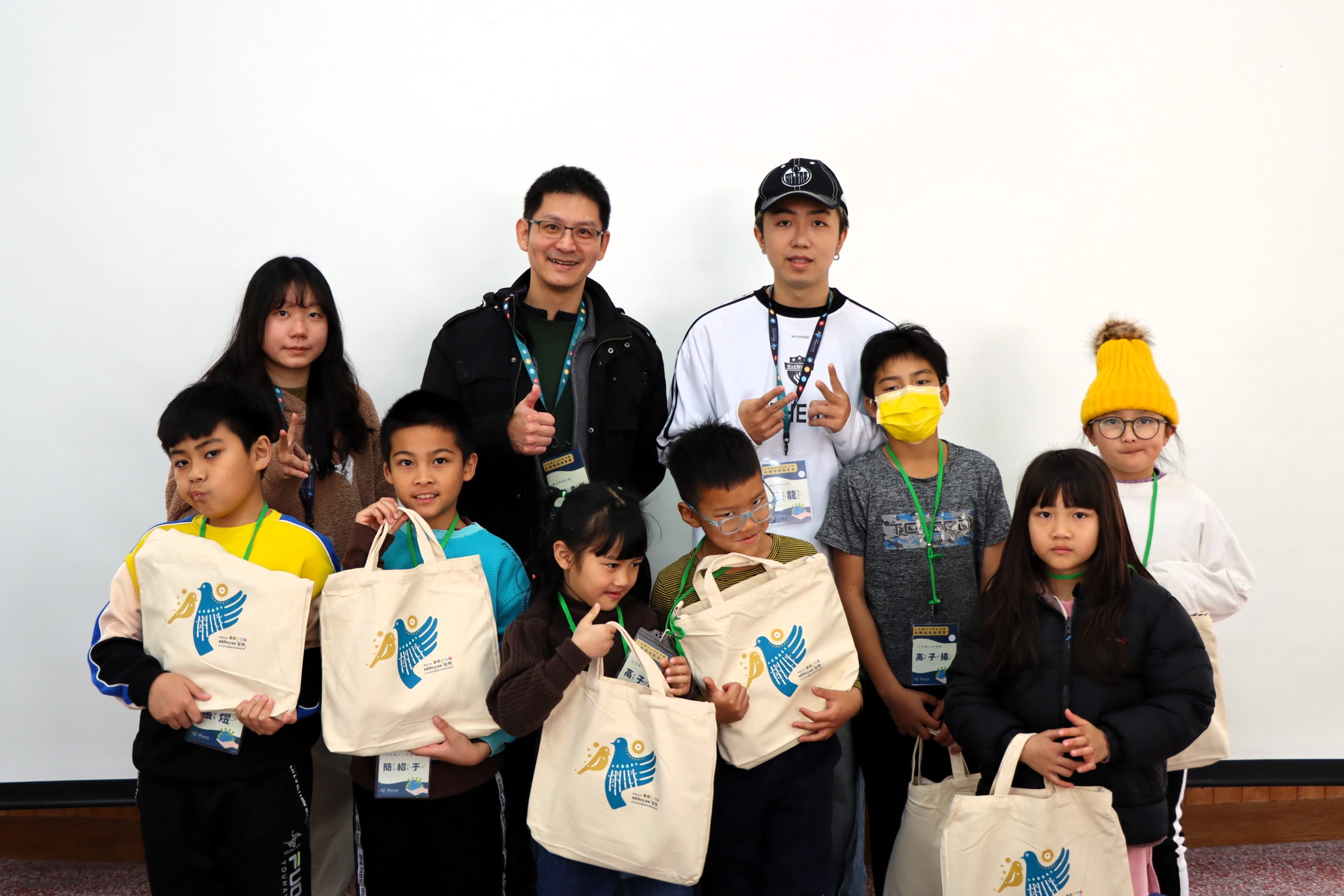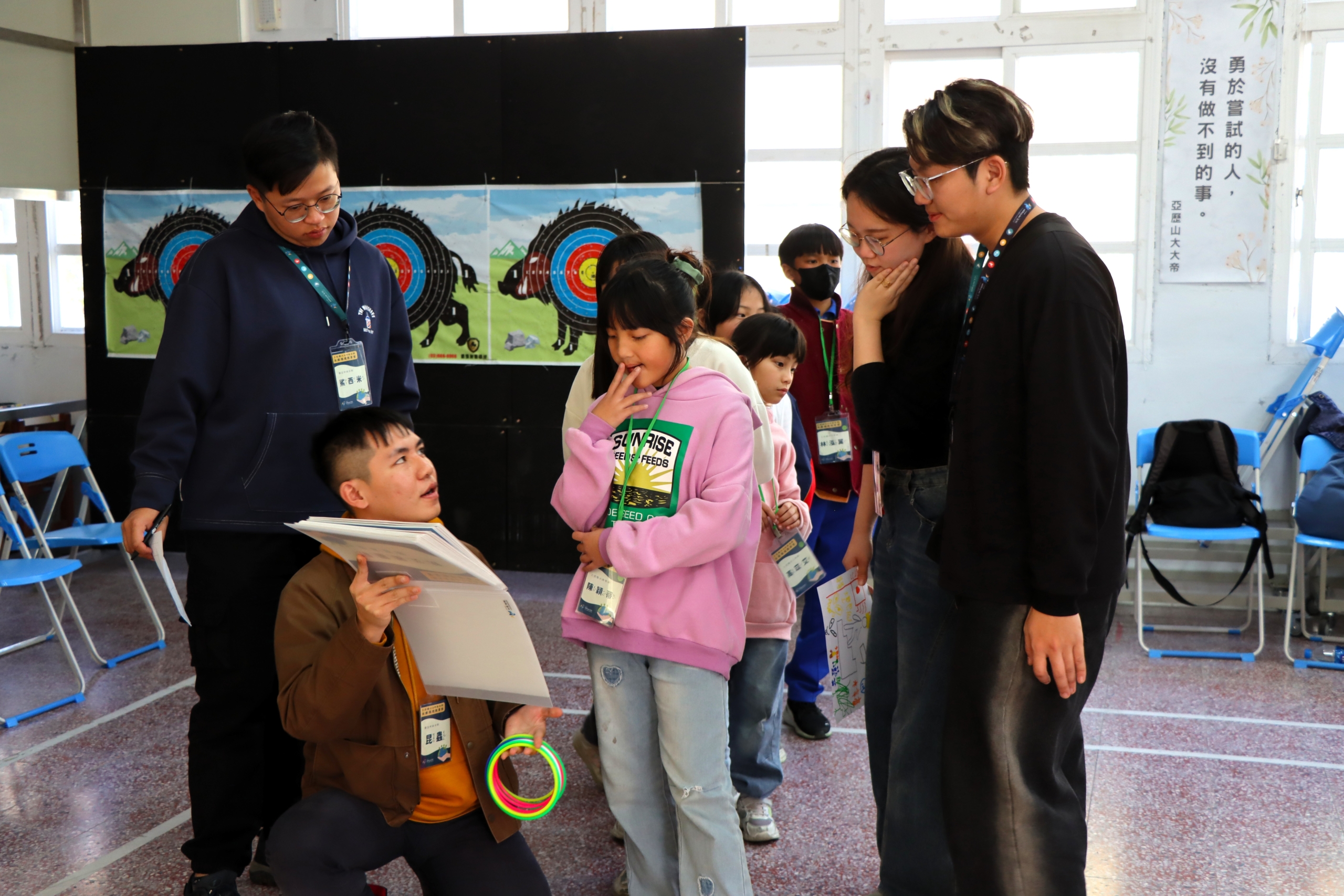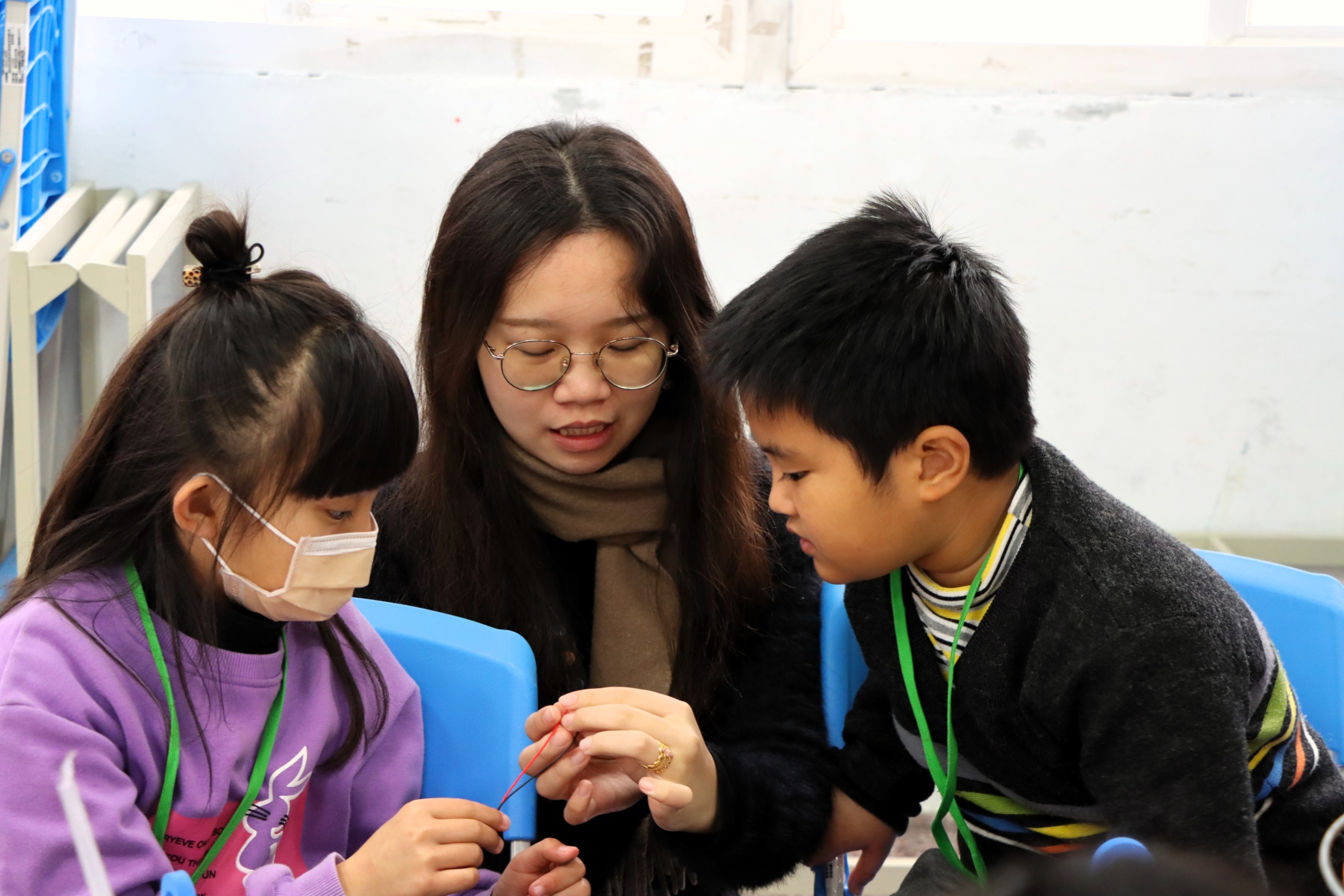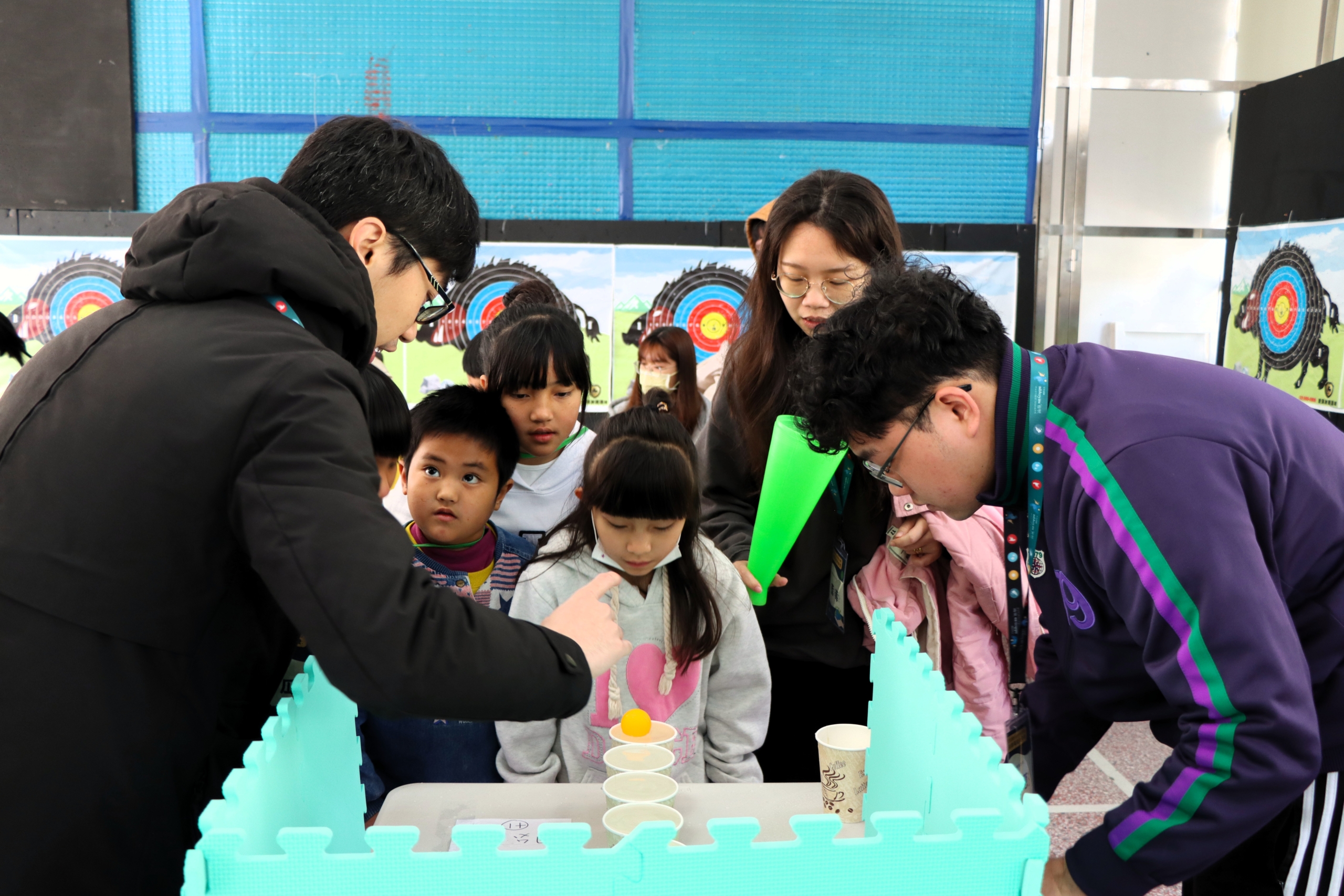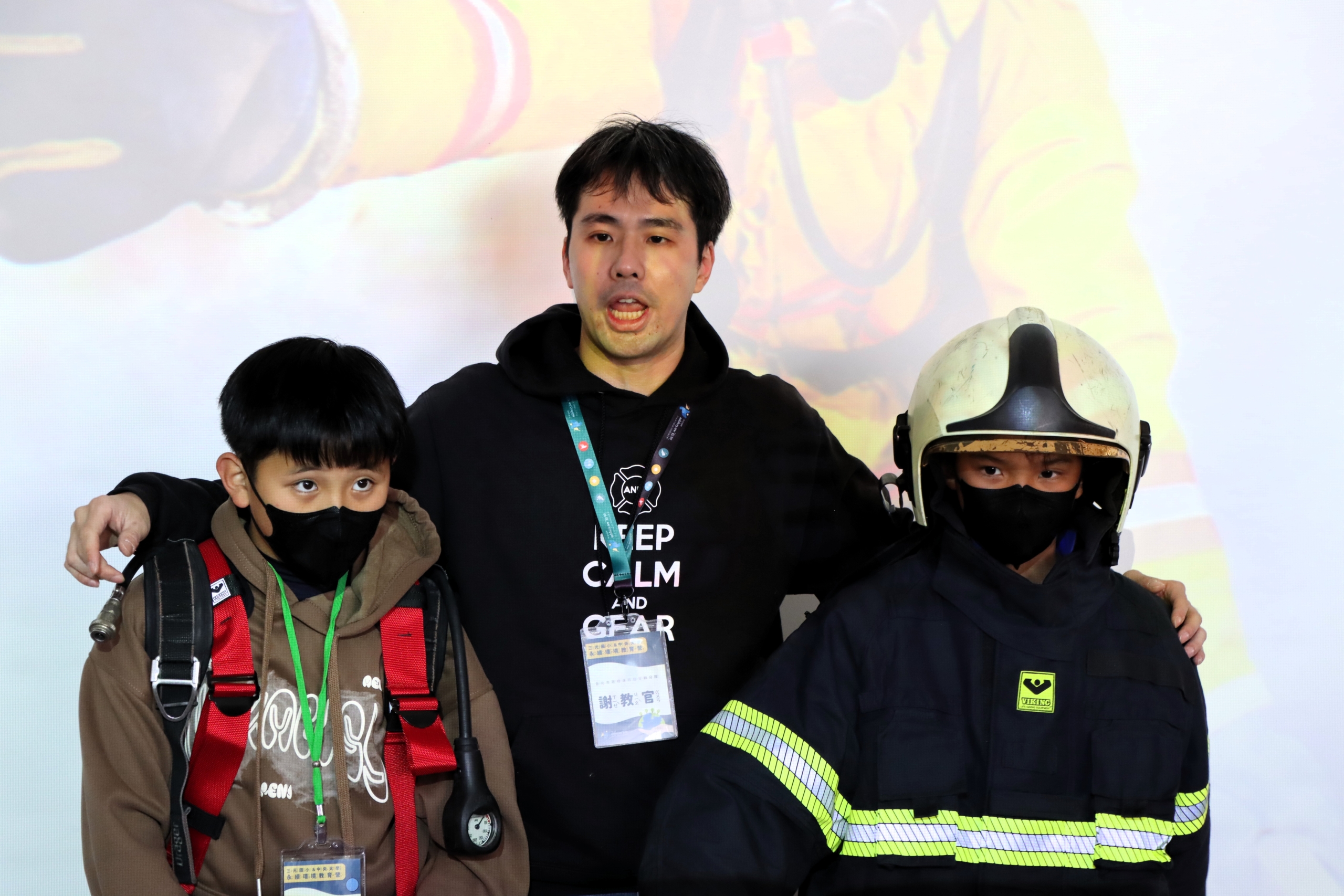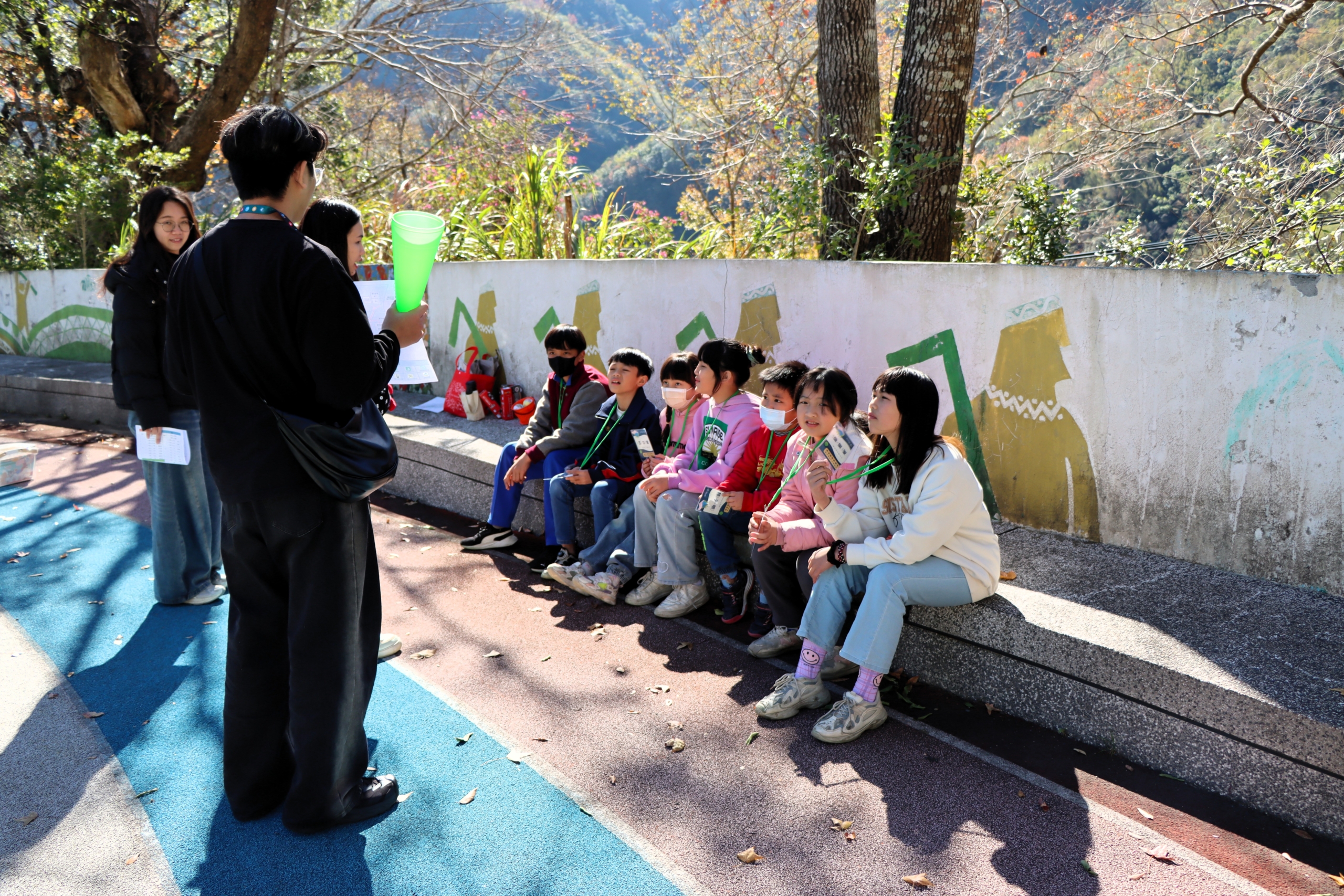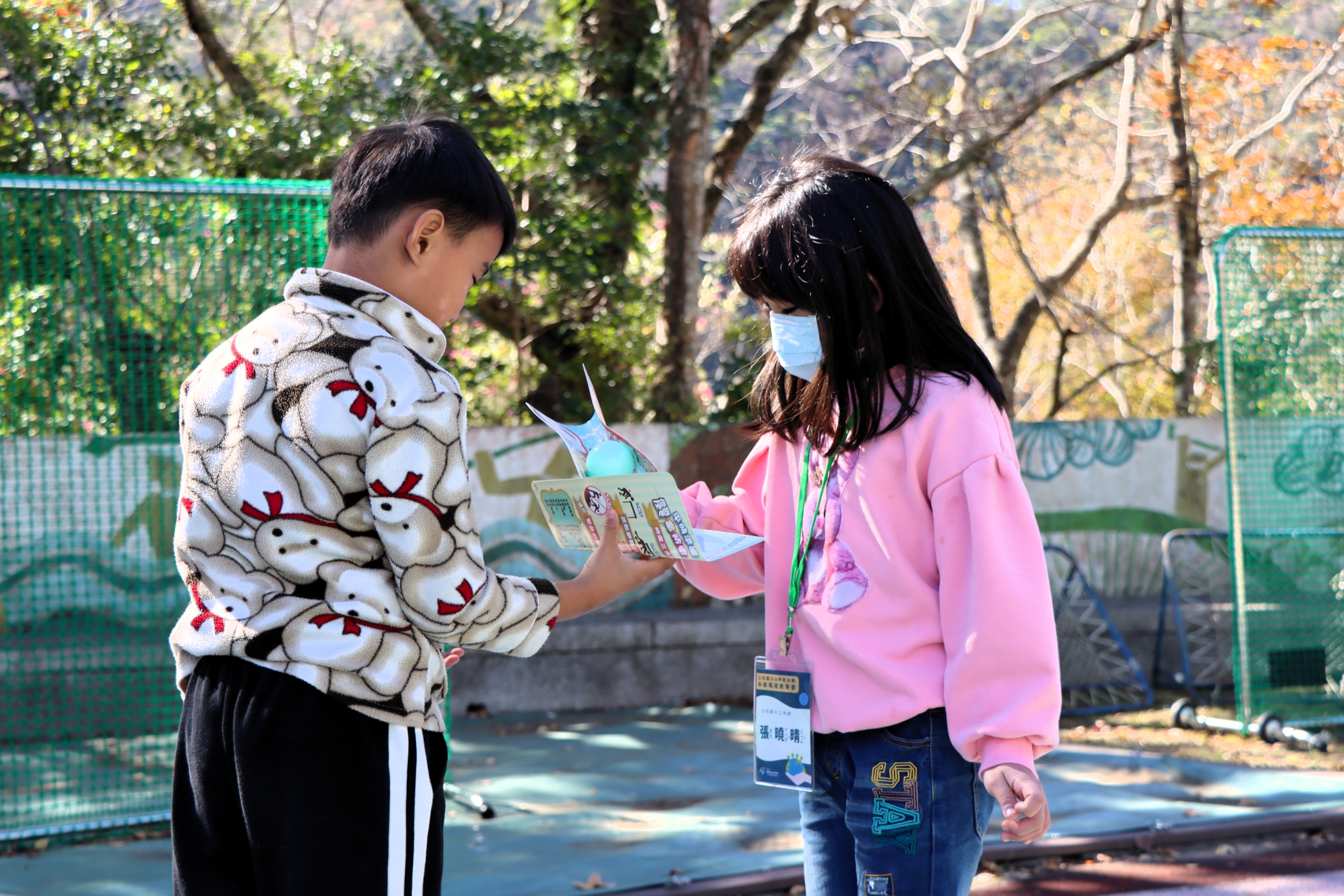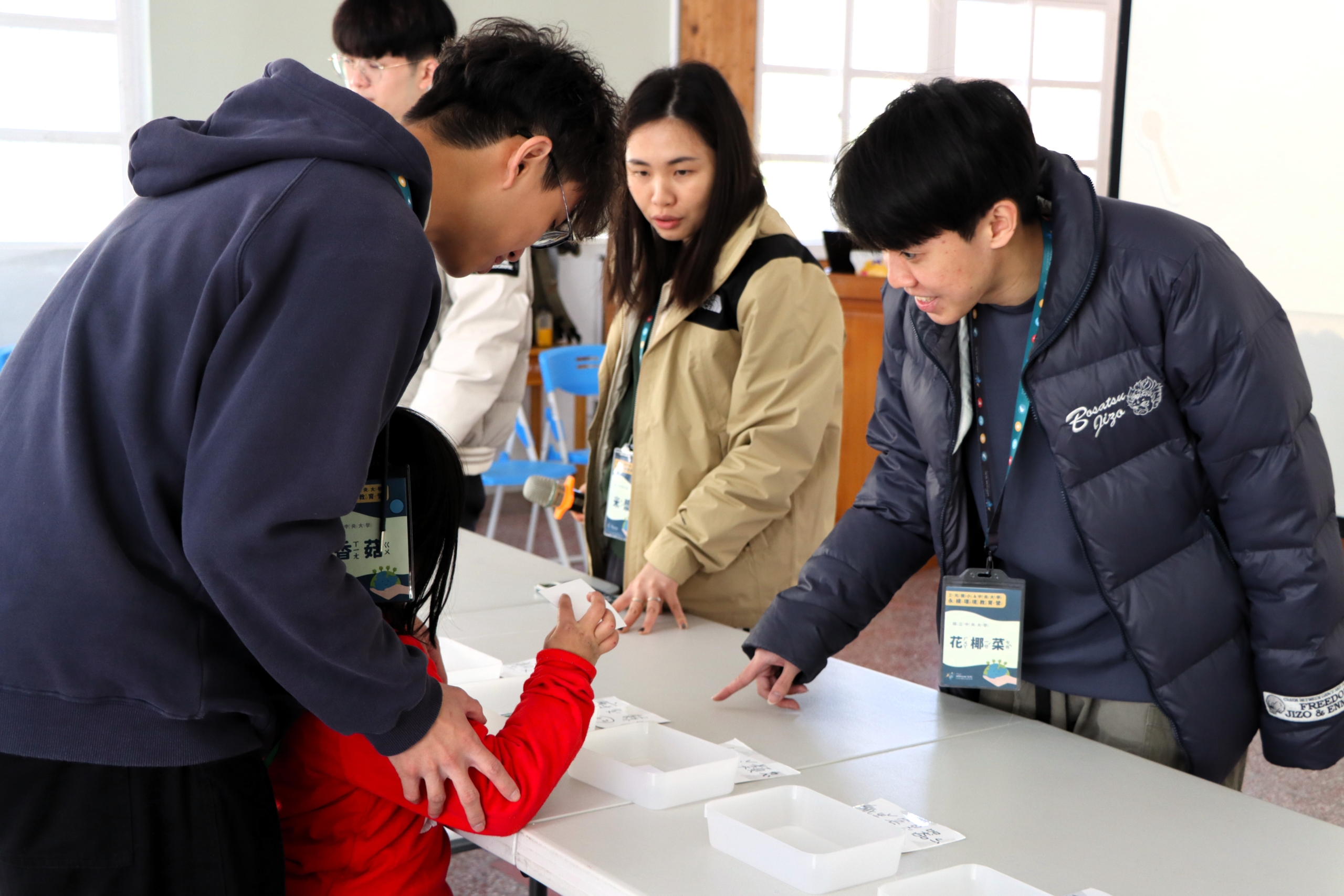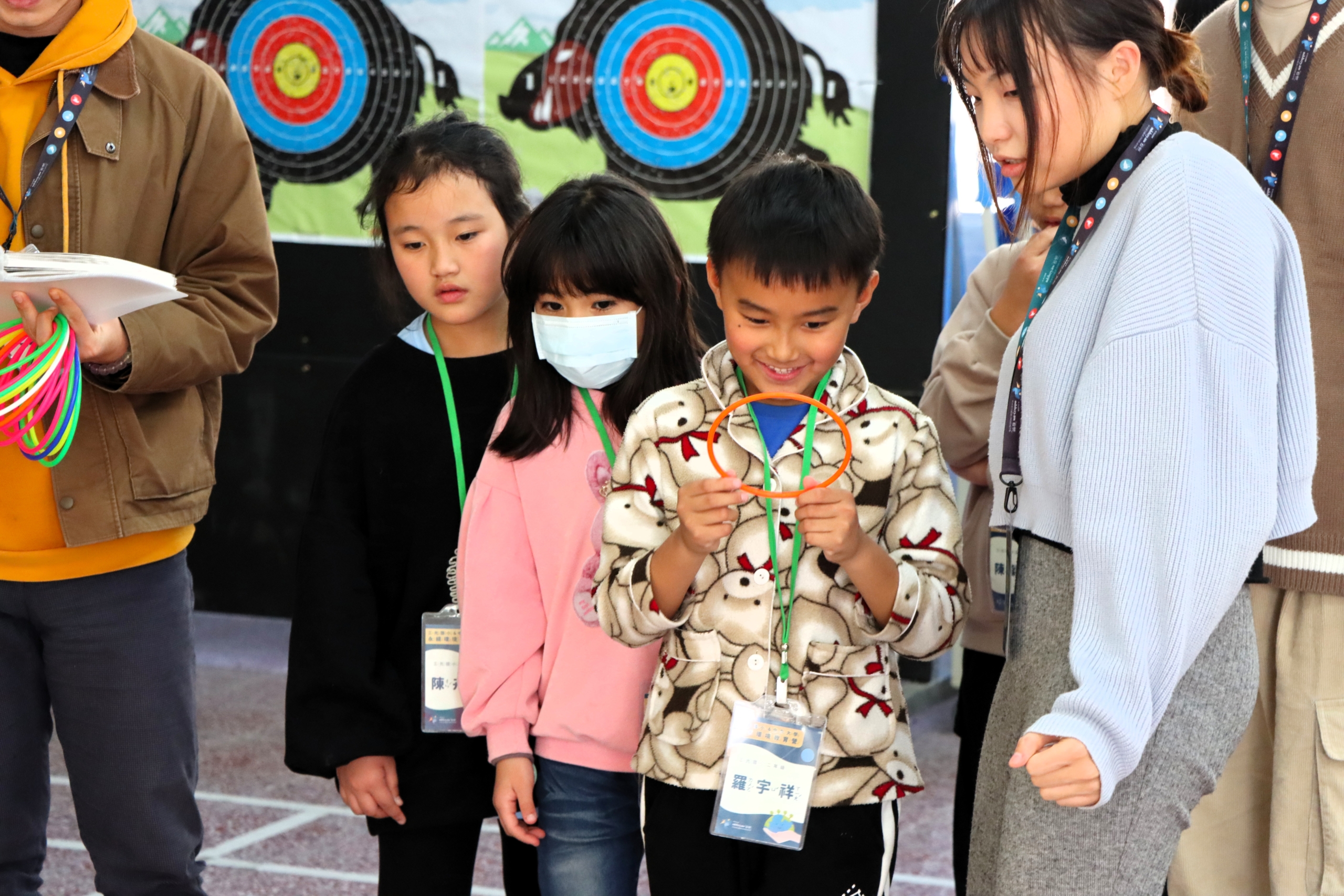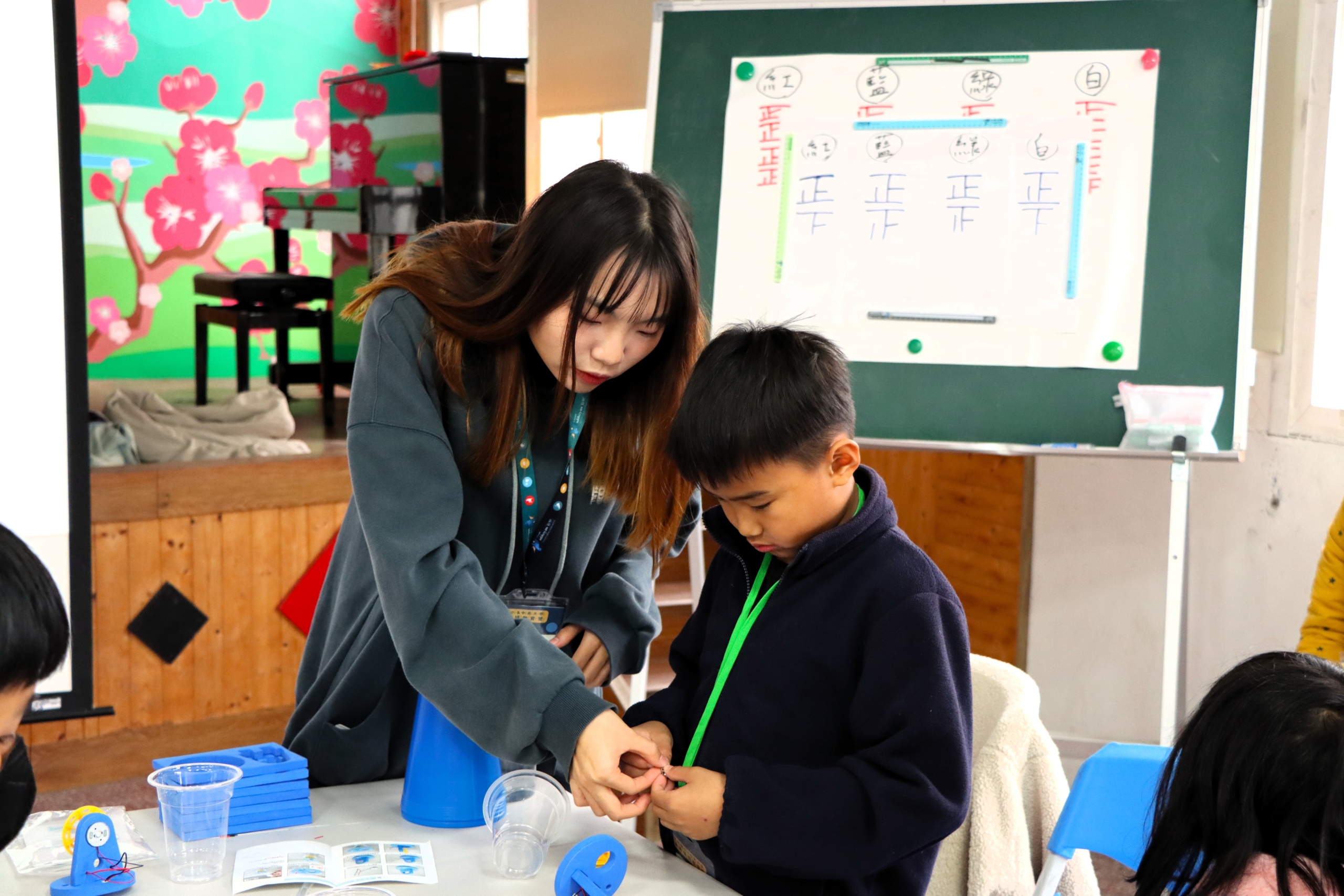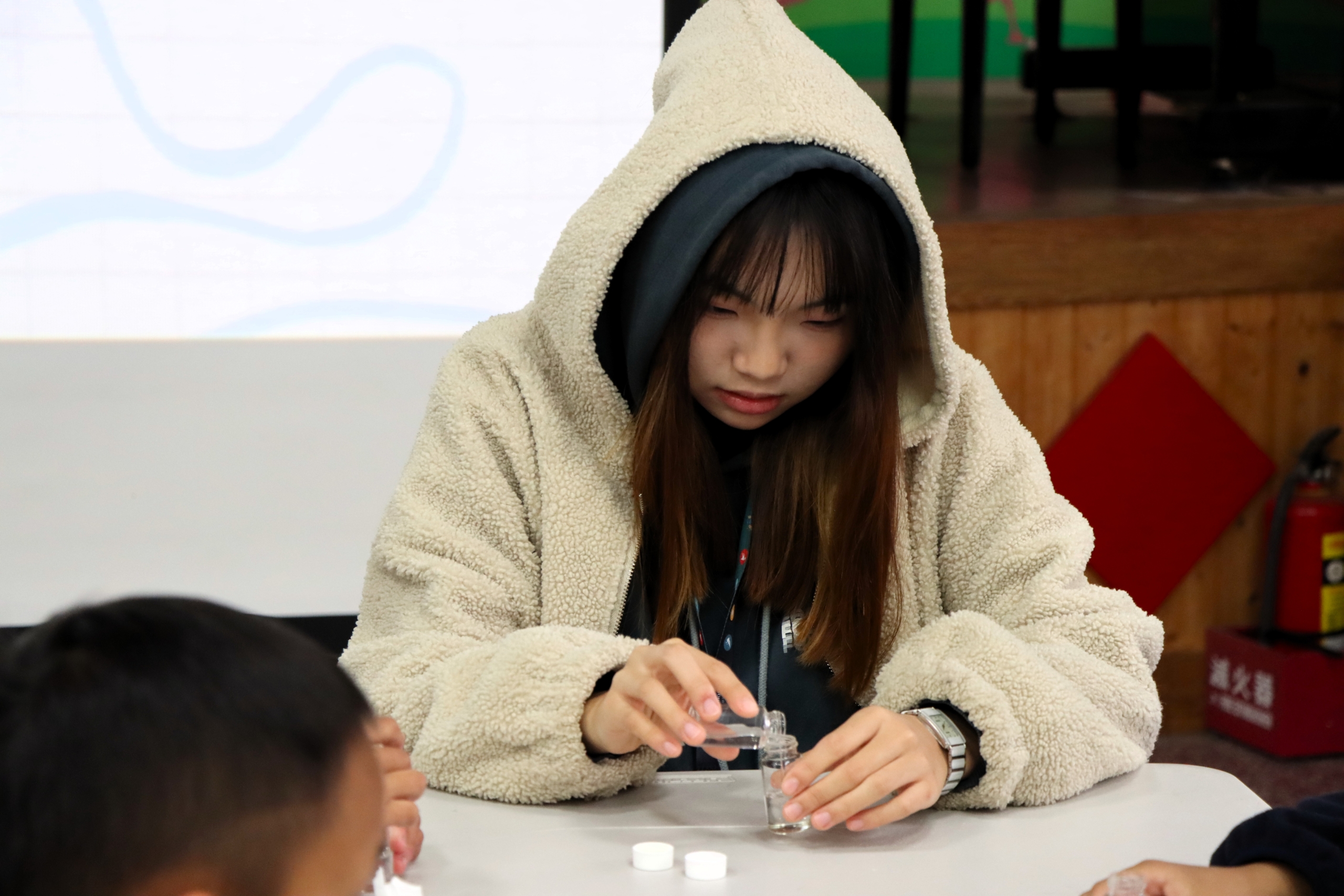Over the past year and a half, my only experience organizing an agricultural education camp was a one-day event in collaboration with Youyou Xiayun Farm. I had never had the opportunity to deeply engage with local students—until now. As a team leader at the Sanguang Elementary School Sustainable Environment Education Camp, I spent three days interacting with children of different ages, guiding them through environment-themed courses while learning just as much from them in return. Although I am about to enter graduate school, this was my first time having such an in-depth and meaningful exchange with indigenous children in a mountainous area.
Our generation faces two pressing challenges: the growing threats of climate change and the need to manage limited natural resources responsibly. To ensure a more sustainable future, environmental awareness must be cultivated from an early age. This camp focused on two key themes—disaster prevention and sustainable development—both of which were not only rich in content but also highly practical.
In terms of disaster prevention, the mountainous terrain and limited resources make natural disasters more frequent than in lowland areas, while rescue efforts often face delays. Understanding common disasters in these regions and learning self-rescue skills is therefore essential. The sustainability courses covered topics such as water resource management, energy use, and environmental protection. However, making these complex concepts engaging and understandable for children was a challenge. Through interactive games and activities, we transformed what could have been dry material into something fun and accessible, which significantly improved the children’s focus and left a lasting impression on them.
Growing up in the city, I was struck by the differences between urban children and those in the mountains. Their enthusiasm, attentiveness, and eagerness to participate in class discussions left a deep impression on me. In my own school experience, whenever teachers asked a question, most students—including myself—would instinctively look down, hoping not to be called on. But at this camp, the children’s response was completely different. They eagerly raised their hands, spoke with confidence, and even if they didn’t know the answer, they still wanted a chance to express themselves. Some even felt disappointed when they weren’t called on. Their proactive and fearless approach to learning stood in stark contrast to what I was used to, making me reflect on how much I could learn from them.
Spending time with children and fellow team leaders from different backgrounds also led to many unexpected experiences. I vividly remember one lesson when the teacher asked, “Who here has something planted at home?” To my surprise, more than 80% of the children raised their hands. For them, this was nothing out of the ordinary, but for us team leaders and instructors, it was astonishing. In our daily lives, farming is rare, and this contrast deepened my curiosity about their way of life. It also made me cherish this rare opportunity for exchange even more.
Text by Yang, Shi-Wei
Edited by Li, Ruo-Chia
Photos by Li, Ruo-Chia
My experience as a team leader at Sanguang Elementary School was unlike any of my past service experiences at other elementary schools. What left the deepest impression on me was the children’s boundless enthusiasm, vibrant energy, and expressive emotions. As someone who isn’t naturally outgoing, I initially had some concerns: *Will I be able to connect with the kids?* *Will they find me boring?* But once I started interacting with them, I was quickly swept up by their infectious energy. The moment the bell rang for recess, they would excitedly grab my hand, eager to show me around and play. Every now and then, they would give me a warm hug and sweetly say, “I like you.” Such pure and unfiltered emotions—something that society had long conditioned me to suppress—were a beautiful reminder of the sincerity of childhood. Meeting these children felt like a privilege.
The three-day program was packed with meaningful sustainability education, and the children were genuinely engaged. A moment that touched me deeply was when a second-grade girl, during a lesson on waste management on the third day, suddenly said, “I remember we learned about water pollution yesterday!” Younger children often need more guidance when answering questions, yet she not only remembered what was taught the day before but also connected it to new concepts. It was a powerful testament to the value of sustainability education.
The camp covered topics such as disaster prevention, energy, and waste management, with thoughtfully structured content—some of which was even new to me. Watching the children absorb knowledge through interactive activities like scavenger hunts, board games, wind power experiments, and weather bottle workshops made me truly admire the course design. The program leveraged the children’s natural love for hands-on activities, ensuring they could *learn by doing*, which significantly enhanced their engagement and retention. As a team leader, I was fully immersed in these activities alongside them, and I found myself learning just as much as they did.
Though Sanguang Elementary School is small, this close-knit environment fosters strong bonds between students and teachers. In the school courtyard, a large poster board displays photos and names of all students and teachers, with upcoming birthdays highlighted. This creates a sense of belonging, allowing students across different grades to play together freely while teachers provide more personalized attention to each child. I believe this nurturing environment plays a key role in shaping the children’s confidence and willingness to express themselves. In class, there was never a moment of silence when a question was asked—students eagerly raised their hands, excited to participate. This kind of learning atmosphere is rare and truly precious.
The success of this camp was made possible by the efforts of many people. First, I am deeply grateful to the three assistant coordinators who meticulously planned every detail and continuously checked in on us to ensure everything ran smoothly. I also want to thank my fellow team leaders—without them, I wouldn’t have discovered the joy of a small-town convenience store during breaks or had the chance to hike the Baling Ancient Trail to the Lalashan Visitor Center after camp. Their support and camaraderie made handling unexpected situations much easier. A special thanks to my teammate, Shi-Wei, whose ability to connect with the children and handle challenges with ease was truly admirable. With his help, we overcame many small obstacles together.
I am also incredibly grateful to the teachers at Sanguang Elementary School, who prepared warm ginger tea for us on chilly mornings and constantly looked after the children, ensuring that the camp ran smoothly. Of course, I must also thank the instructors, who worked tirelessly to make complex sustainability concepts engaging and easy to understand through interactive games and activities. Their ability to *teach through play* was one of the camp’s greatest highlights. And last but not least, a heartfelt thank you to our driver, who transported us safely between the university and the school each day, carefully handling our luggage and navigating the winding mountain roads with great care.
Most of all, I want to thank the wonderful children of Sanguang Elementary School. The drawings you gave me, the words you spoke, and the moments we shared playing together have become some of my most cherished memories. I look forward to the day we meet again and you tell me, *”I still remember you!”*
Looking back, I am incredibly grateful for this unforgettable experience as a team leader during my university years. Whether through sustainability education or interactions with the children, I walked away with so much more than I expected. I gained a deeper appreciation for the work of firefighters, a new understanding of Taiwan’s geography and energy industry, and valuable skills in guiding conversations with children. This experience has strengthened my passion for sustainability and deepened my commitment to working with young students.
To my juniors—if you ever have the opportunity to join a program like this, I highly encourage you to experience it for yourself. You won’t regret it.
Written by Zhang, Qiao-Rou
Edited by Li, Ruo-Chia
Photos by Li, Ruo-Chia
Although I have participated in camps before, this was my first time serving as a team leader for an off-campus program and my first time interacting with children from mountain communities. Even though the camp lasted only three short days, I believe this experience will remain an unforgettable memory, and I sincerely hope this connection will continue in the future.
From the very first day, I could feel the difference in atmosphere compared to my previous experiences. Before the activities even began, I had a brief encounter with a young girl outside the restroom. Before I could even think of how to start a conversation, she enthusiastically greeted me and eagerly asked me all sorts of questions, showing no hint of shyness or hesitation. Over the next two days, she continued to seek me out, engaging with me as if we had known each other for a long time. As the camp officially began, I was further struck by the children’s warmth and sincerity. Despite meeting us for the first time, they called out our nicknames from our name tags without hesitation, greeting us as if we were already friends. In class, they listened attentively to the instructors, eagerly sharing their own experiences and raising thoughtful questions. Whenever an instructor asked a question, hands shot up instantly, their excitement to participate shining through.
Growing up in a fast-paced urban environment, I couldn’t help but notice the stark contrast between children from the mountains and those from the city. This difference made me appreciate the unique qualities of these children even more.
By the second day, the children’s initial shyness had completely melted away, replaced by even more interaction and closeness. During recess, they would pull us by the hand, inviting us to play, asking endless questions, and enthusiastically involving us in their activities—unfazed even by the rain. They challenged us to races and baseball games, firmly reminding us, “You have to go all out—no holding back!” Their emotions were just as open and uninhibited. When disagreements arose between friends, they would immediately come to us, eager to share their frustrations. When they lost a game, they didn’t hide their disappointment. At times, their reactions left me unsure whether to comfort them or laugh, but I soon realized that as long as I listened patiently and guided them gently, they were always able to understand and accept the situation. Each child had their own distinct personality and required a different approach, but one thing remained the same—they all longed to be understood and cared for, rather than being immediately dismissed or scolded.
Sanguang Elementary School sits at the foot of Lalashan, and from the moment I first saw its breathtaking scenery, I was captivated. Here, away from the noise and rush of the city, I felt completely immersed in nature. Although keeping up with the children’s boundless energy was exhausting at times, I found myself feeling deeply rejuvenated by the experience. The drawings they gave me, the small snacks they secretly slipped into my hands, the warm hugs, and their bright, sparkling eyes—all carried a sense of trust, anticipation, and pure, unfiltered emotion.
This experience was truly meaningful to me. It not only made me realize how much I still have to learn and grow, but also deepened my understanding of the differences between urban and mountain children. More importantly, it reawakened a childlike wonder and vitality within me that I had long forgotten. I sincerely hope that one day, I will have the opportunity to return and continue this precious connection.
Written by Lai, Qing-Hui
Edited by Li, Ruo-Chia
Photos by Li, Ruo-Chia
This was my first time stepping into a place so far removed from the city, where the noise and restlessness of urban life seemed to disappear entirely. Time felt as if it had slowed down, nestled within the mountains, untouched by excessive development. The landscape before me was breathtaking, like a painting brought to life, and the children’s smiles were filled with a purity rarely seen elsewhere. This experience not only deepened my understanding of environmental conservation and disaster prevention but also helped me reconnect with a long-lost sense of simplicity and gratitude.
The day before the camp began, we arrived at Sanguang Elementary School to set up the venue. The moment I stepped onto campus, I was immediately captivated by the stunning scenery. Rolling mountains layered upon one another, their peaks wrapped in delicate wisps of drifting clouds. The sky, an endless expanse of deep blue, stretched seamlessly above the lush greenery of the forest. The school itself was small and unassuming, yet it was embraced by nature’s grandeur, making it feel like a hidden sanctuary amid the mountains.
However, what truly left a lasting impact on me was not just the scenery but an unexpected conversation. On the first day of the camp, during a lesson on disaster prevention, the instructor casually mentioned “LEGO.” To my surprise, a young girl raised her hand and asked, “What is LEGO?” At that moment, my heart skipped a beat. It made me reflect on my own childhood. Though my family was not extraordinarily wealthy, I had never lacked access to learning resources—so much so that I once complained about not having *enough* LEGO. Yet, for these children, LEGO was an entirely unfamiliar concept. This realization struck me deeply. The things I had always taken for granted might have never even existed in their world.
Standing before them, I felt a wave of complex emotions—gratitude and humility. I was grateful that, despite having fewer material resources, these children’s eyes remained bright and filled with an insatiable curiosity. At the same time, I felt humbled by my own past moments of discontent.
The environmental education program was designed to help the children recognize the natural resources around them and understand how to protect their home. During one of the activities, a young girl gently held my hand and said with innocent determination, “Teacher, I don’t want the Earth to get sick. I want to protect it.” Her words, though simple, struck a chord deep within me. This world may have many challenges, but hope still exists—and these children are living proof of it. Though she may not yet fully grasp the complexities of sustainability, she had already internalized its most fundamental principle: to love and protect the Earth. Her words felt like a small yet powerful light, dispelling my uncertainties about the future and reminding me that as the next generation grows and finds its voice, the world will continue to hold endless possibilities.
As I bid farewell to the children, my heart was filled with gratitude. This camp was not just about me teaching them—it was a journey of mutual learning. They taught me the value of contentment, the importance of appreciating the present, and the beauty of kindness in its purest form. On the way back, I quietly set a goal for myself: to seek more opportunities in the future to bring educational resources to different communities, helping more children see a bigger world. At the same time, I wanted to remind myself—no matter where I go, to always hold onto a sense of purity, to cherish each moment, and to remain grateful for what I have.
The golden afternoon sunlight over the mountains of Sanguang Elementary School didn’t just bring warmth to the children and teachers—it quietly illuminated my heart as well. Though this journey has come to an end, the emotions and lessons it gave me will stay with me forever.
Written by Lan, Jing-Shan
Edited by Li, Ruo-Chia
Photos by Li, Ruo-Chia
Participating in the camp at Sanguang Elementary School was a deeply meaningful and enriching experience. In just two and a half days, I truly came to understand Mother Teresa’s words: *“Do ordinary things with extraordinary love.”* Through the eyes of these children, I gained invaluable perspectives and was prompted to reflect on my own approach to life, my values, and what truly matters.
Nestled in the mountainous region of Fuxing District, Taoyuan, Sanguang Elementary School is surrounded by breathtaking landscapes but has limited resources. As a team leader, I initially felt a sense of uncertainty—unsure of how to connect with the children and how to effectively convey the core values of the camp in such a short time. However, as I spent time with them, I was struck by their warmth and enthusiasm. Their eagerness to learn and curiosity about the world filled me with hope, like seeds of possibility beginning to take root.
The camp’s curriculum focused on three main themes: **fire safety, natural disaster preparedness, and environmental awareness**. My role as a team leader was to guide and support the children as they engaged in these activities. During the fire safety course, they learned how to respond to fire emergencies through interactive lessons, thinking critically about staying calm and making smart decisions in a crisis. Their attentiveness and enthusiasm were truly inspiring.
However, what moved me the most was the environmental awareness session. During a waste sorting game, the children’s deep concern for the environment was evident. One child innocently asked me, *“If we keep protecting the environment, does that mean bad things will stop happening?”* This simple question gave me pause. To them, environmental protection isn’t just a responsibility—it’s a hopeful vision for a better future. While I admired their optimism, I also felt the weight of reality—the environmental challenges created by previous generations are now burdens these children must bear and strive to fix.
Many moments from the camp left a lasting impact on me. After one class, a child quietly asked, *“Brother, why do people say our home is so remote?”* I replied, *“Your home is beautiful and unique. Many children in the city would love to have a place like this.”* Hearing this, he gave me a shy but contented smile. This moment made me realize how much children in rural areas need encouragement and confidence.
Another memorable interaction happened during an art activity when a young girl, while drawing Sanguang Elementary School, suddenly put down her pencil and said, *“I don’t think I can draw it well.”* I reassured her, *“Your drawing reflects how you see the school in your heart—there’s no right or wrong.”* Encouraged by my words, she picked up her pencil again and created a vibrant drawing filled with smiling faces and lush greenery. Beaming with pride, she showed it off to everyone. This simple exchange reminded me that education is not just about transferring knowledge; it is about nurturing confidence, fostering creativity, and inspiring growth.
The children’s sincerity and fearless curiosity also led me to reflect on my own values. In the fast-paced reality of daily life, we often become overwhelmed by responsibilities and expectations, forgetting to appreciate the present. But these children reminded me how to embrace life’s simple joys. Their gratitude for small things and their unfiltered wonder about the world reignited my own sense of passion and hope.
One of the most touching moments was at the end of the camp when the children handed me their handmade cards, filled with heartfelt messages and colorful drawings. These small yet sincere gestures became my most treasured souvenirs from the experience.
This camp at Sanguang Elementary School was not only an opportunity for me to contribute but also a chance to gain a deeper understanding of the challenges and beauty of rural education. I hope my time here has helped open up new possibilities for these children, just as they have opened my heart to new perspectives.
As this camp has taught me, *“Do ordinary things with extraordinary love.”* Every act of kindness and encouragement, no matter how small, becomes part of a child’s journey. And in return, their laughter, growth, and bright smiles are the greatest reward I could ever receive.
Thank you, Sanguang Elementary School students. May you continue to grow with joy, curiosity, and endless possibilities, surrounded by laughter and the warmth of those who believe in you.
Written by Zhong, Wei
Edited by Li, Ruo-Chia
Photos by Li, Ruo-Chia
I had previously participated in and helped organize the Aquaponics Food and Agriculture Education Camp, another initiative under the USR program. Through a series of courses and activities, I witnessed the children’s boundless curiosity for new knowledge and their joy in having us there to guide them. So, when I learned about this Sustainable Environment Education Camp, I didn’t hesitate to join, eager to engage with the children once again through another meaningful experience.
On the first day, when we first met our group of children, they seemed a bit shy—quite different from the lively and energetic image described by the assistant coordinators. During the first class, when the instructor asked for volunteers to interact, the children hesitated, reluctant to raise their hands or speak up. However, my past experience with education camps had given me insight into how to encourage children and foster a positive team atmosphere. With our patient guidance and the instructor’s engaging teaching style, the initially reserved children gradually became more confident. Soon, they were so eager to participate that they would raise their hands even before the instructor had finished asking a question.
Later, an exciting checkpoint-based game helped further break the ice, and their enthusiasm came to life. As the camp progressed, their focus in class grew stronger, and whenever a lecturer or graduate student posed a question, nearly every child would raise their hand, creating an atmosphere that was vibrant and full of energy.
This camp covered a range of essential environmental topics, including fire escape techniques, environmental pollution, energy conservation, and sustainability education—knowledge that is crucial in modern life. The lessons combined theoretical concepts with interactive elements such as Q&A sessions, games, and hands-on experiments to enhance learning outcomes. By encouraging the children to think critically and engage in practical activities, they not only gained a deeper understanding of the material but also formed lasting memories. Throughout this process, they developed teamwork and collaboration skills, making learning both natural and highly effective. After these few days of learning and interaction, I believe that not only did the children benefit from the program, but we, as team leaders, also gained a deeper awareness of environmental issues.
Looking back, this camp left a profound impression on me. While keeping up with such an energetic group of children was at times exhausting, seeing their enthusiasm and full engagement made all the fatigue disappear. I feel incredibly grateful to have been part of this experience and to have played a small role in shaping their learning journey.
Written by Wang, Yi-Hong
Edited by Li, Ruo-Chia
Photos by Li, Ruo-Chia
For this three-day program under National Central University’s USR initiative, we traveled to Sanguang Elementary School in Taoyuan’s Fuxing District as team leaders. Unlike my previous experiences, this time, we ventured to a higher altitude and deeper into the mountains, making the journey all the more profound—filled with surprises and touching moments. Over these three days, we explored a wide range of topics with the children, from basic waste sorting concepts to essential fire and earthquake escape techniques. These practical lessons helped enhance their awareness of safety in daily life. Watching them eagerly absorb new knowledge and ask thoughtful questions, I could feel their curiosity and excitement about the world. I sincerely hope they carry this passion forward as they continue to explore life’s endless possibilities.
Although Sanguang Elementary School is small, with only a handful of students, the bonds between them are as close as family. As soon as the class bell rang, the children would rush over, eager to pull us into their games. Their pure, unfiltered joy had a way of touching the heart effortlessly. Whether it was running around in a game of tag or simply watching them play with unwavering focus, every moment radiated a sense of simplicity and happiness. Compared to city children, who are often more reserved, the students here were noticeably more open and expressive. Whether in class discussions or casual conversations, they never hesitated to share their thoughts, exuding a natural confidence and enthusiasm that reflected the unique warmth of Atayal culture. Their unrestrained energy was like a fresh mountain breeze, filling us city dwellers with a sense of raw, unfiltered vitality.
The curriculum also introduced green energy and meteorology, allowing the children to explore these topics in an interactive way. Through creating weather bottles, they observed small changes inside, gradually uncovering the mysteries of weather patterns. For me, this camp was also an unexpected learning experience, as it was my first time encountering hydrogen energy—a promising and sustainable technology. Its potential to reshape the energy landscape left me deeply inspired about the future of green innovation. Over these three days, we not only guided the children in learning and growth but also joined them in opening a window to a more sustainable world, discovering knowledge deeply connected to everyday life.
For us team leaders, who are often caught up in the fast-paced rhythm of city life, these few days were more than just a volunteering experience—they were a rare opportunity to reconnect with nature. We stayed in the quiet village of Xiabaling, nestled deep in the mountains, far removed from the noise of urban life. This allowed us to slow down and truly take in the beauty of our surroundings. After setting up on the first day, we took a walk along the historic Baling Ancient Trail. The winding mountain paths, the crisp forest air, and the gentle rustling of leaves seemed to remind us to embrace the beauty of simplicity. Along the way, we even met a friendly black dog named Amei, who accompanied us on our journey, adding an unexpected touch of warmth and charm to the experience. In this serene environment, we not only unwound but also rediscovered a long-lost inner peace.
One of the simplest yet most cherished memories from this trip was our nightly routine. Each evening after wrapping up our activities, the first thing we did was rush to the village’s small general store to stock up on snacks for our late-night gatherings. While there were no large chain stores like in the city, this little shop, surrounded by lush greenery, quickly became our own hidden treasure. Those brief but joyful visits turned into a small ritual that we all looked forward to—proof that happiness isn’t found in extravagance, but in life’s small, ordinary moments and the warmth of shared experiences.
Written by Sun, Yi-Hsin
Edited by Li, Ruo-Chia
Photos by Li, Ruo-Chia

